Democrats 2020: What their key issues are
- Published
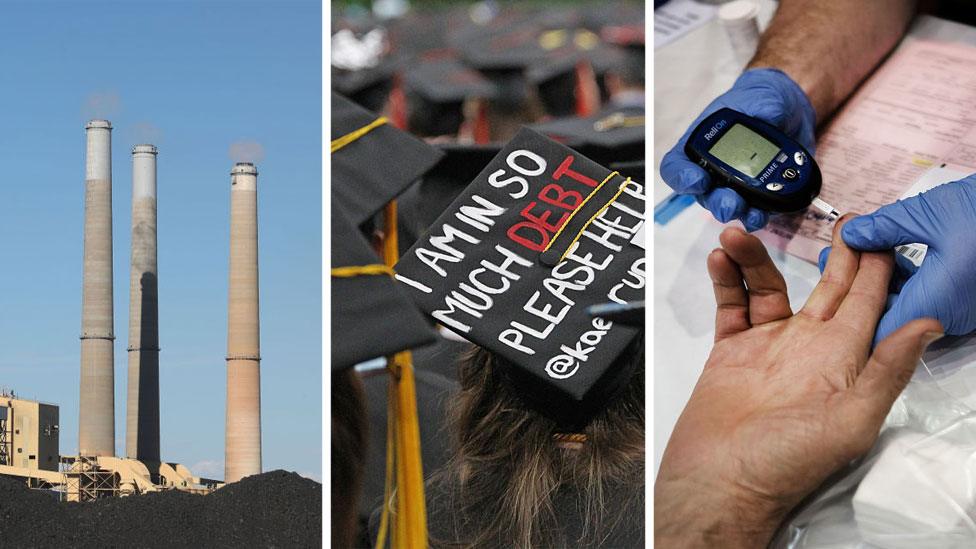
Climate change, student loans and healthcare are some of the key issues
There are currently 11 Democrats hoping to win their party's nomination and take on President Donald Trump as he seeks re-election in 2020.
The BBC's Anthony Zurcher looks at strengths and weaknesses of all the candidates.

Joe Biden
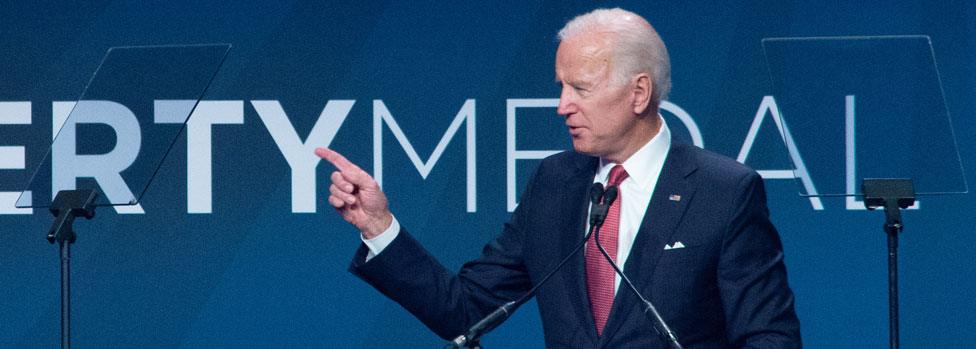
Who? Former vice-president and veteran senator
Key issues: Rebuilding the middle class; investing in federal infrastructure; tuition-free public universities
One policy: Similar to the Green New Deal, Biden's Clean Energy Revolution would make the US economy 100% clean energy based with net-zero emissions by 2050, as well as target polluters with fees and quotas
Anthony's take: Joe Biden entered the Democratic presidential contest as a front-runner, if not the front-runner. He has near universal name recognition, high approval ratings within the party and among political independents, a close connection to the halcyon days (at least, for Democrats) of the Obama presidency, and the potential to raise vast amounts of campaign money through traditional Democratic donor networks.
Of course, so did Hillary Clinton in 2015 - and we all know how that turned out.
Like the former secretary of state, Mr Biden in his launch video seems to be defining himself as much by who he isn't - Donald Trump - as what he wants to do. It was an oft-criticised strategy for Mrs Clinton in 2016, but with two years of the Trump presidency in the books, Mr Biden seems to be betting that a majority of Americans who have now seen Trumpism in practice have had enough.
A look back at Joe Biden's life and political career
Mr Biden shares some of the political weaknesses demonstrated in Mrs Clinton's presidential race as well. Her lengthy time in the public eye left a long record for her opponents to pick apart, and bound her to a status quo establishment many Americans had come to distrust.
Expect the former vice-president's position against school bussing to end segregation in the 1970s, his chairmanship of the Clarence Thomas Supreme Court confirmation hearings in 1991, and his support for the 2003 Iraq War and stringent anti-crime and bankruptcy bills to be spotlighted by the diverse and talented primary field opposing him.
Then there's his advanced age, propensity for verbal stumbles, allegations of inappropriate physical contact and status as a two-time loser in past White House bids.
The former vice-president has a lot going for him. He also has a lot going against him. The durability of his campaign is one of the big questions hovering over the early days of the 2020 Democratic race. Those questions will soon be answered.
What Trump has said: "Welcome to the race Sleepy Joe. I only hope you have the intelligence, long in doubt, to wage a successful primary campaign."

Bernie Sanders
Who? The 2016 runner-up needs no introduction
Key issues: Medicare-for-All universal healthcare coverage; raising taxes on the wealthiest Americans; upping the minimum wage
One policy: Completely eliminating $1.6tn in existing student debt - regardless of income, unlike his rival Elizabeth Warren - and making public colleges, universities and trade schools tuition-free by taxing Wall Street
Anthony's take: After building a grassroots political movement that roiled the Democratic Party in 2016, Bernie Sanders is making another run at the prize.
This time, he won't be the rumpled underdog. He'll start the race near the front of the pack - with advantages in small-donor fundraising, name recognition and a 50-state organisation of loyalists.
His front-runner status will come with a price, however. Unlike 2016, when Hillary Clinton largely avoided confronting the Vermont senator for fear of alienating his supporters, his opponents will have no such reluctance this time.
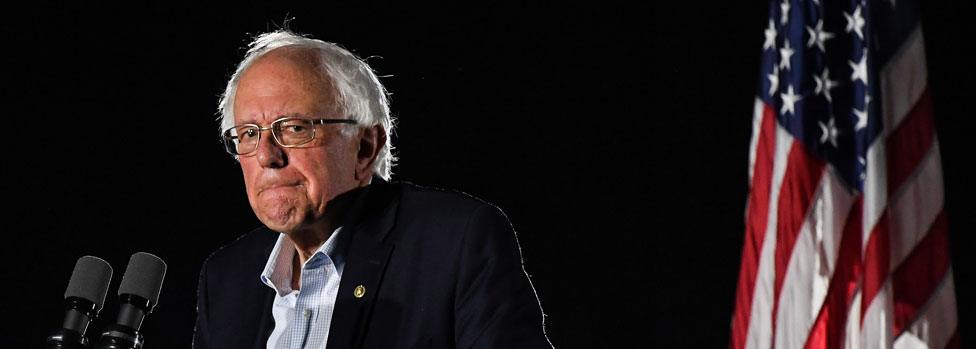
In 2016, the self-proclaimed "Democratic socialist" staked out a progressive agenda in contrast with Ms Clinton's pragmatic centrism. Now, in part because of Mr Sanders' efforts, the party has moved left on issues like healthcare, education and income inequality. His message is no longer unique.
The 77-year-old senator will keep his devoted base, but will some former supporters opt for a fresh face? That could lead to conflict with those who believe a Bernie "revolution" is the only way forward, inflaming Democratic wounds not fully healed from the last campaign.
In a crowded field, Mr Sanders has a realistic shot - but it could be a bumpy ride.
What has Trump said? "Bernie is crazy, but Bernie has got a lot more energy than Biden, so you never know."

Elizabeth Warren
Who? Another senator, this time from Massachusetts, a thorn in the side of big banks
Key issues: Wealth tax; healthcare and abortion rights; criminalising corporate negligence
One policy: Erasing college debt based on income level - households earning under $250,000 annually would receive varying levels of debt relief while those earning more would not - and making public college tuition-free, paid for by taxes on wealth
Anthony's take: Elizabeth Warren has been a favourite of the progressive left since she emerged on the political scene to push for tougher regulation of the financial sector after the 2008 economic crash. During her time in the US Senate she became known for her hard-nosed interrogations of Wall Street executives and as an outspoken critic of income inequality.
That loyal base may be enough to rise to the top of a fractured Democratic presidential field.
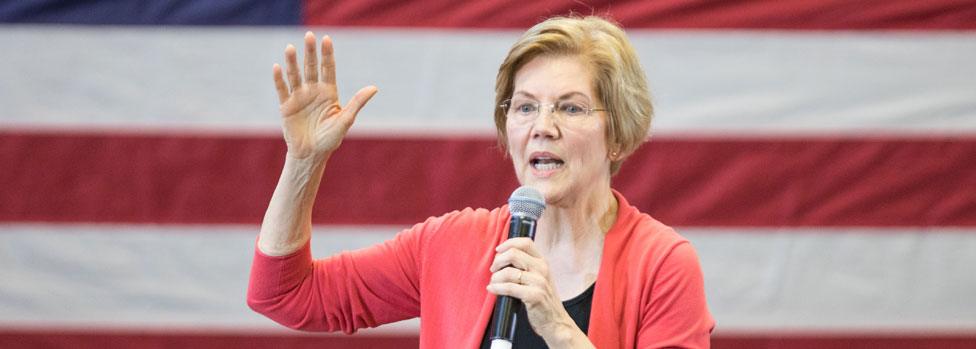
The challenge for Warren will be expanding her appeal beyond the already converted. She's an academic by training, having spent much of her adult career as a professor. Her campaign, however, is already emphasising her working-class upbringing over her educational pedigree, as a means of connecting her personal story to the activist government policies she supports.
Warren will face the challenge of having to define her candidacy while taking fire from Donald Trump, who has repeatedly disparaged her past claims of native American heritage. Although she hardly mentions the president in speeches these days, she'll have to convince Democrats she won't be only the latest politician the president has belittled - and then defeated.
What has Trump said? "I think Pocahontas, she's finished. She's out. She's gone. When it was found that I had more Indian blood in me than she did, and then it was determined I had none, but I still had more, that was the end of her 32-year scam."

Pete Buttigieg
Who? Became a city mayor when still in his 20s and served in the Navy, first openly gay candidate
Key issues: Political reform; LGBTQ rights; college loan relief
One policy: Buttigieg has proposed reshaping the Supreme Court to have five Democratic appointees, five Republican, and five selected by an agreement of the 10 appointed justices
Anthony's take: Most stories published about Pete Buttigieg prominently mention that he is a Millennial - a member of the generation born between 1981 and 1996. That isn't by accident.
The South Bend, Indiana, mayor isn't the only Millennial in the 2020 race - Hawaii Congresswoman Tulsi Gabbard is also 37 - but Mr Buttigieg is positioning himself as a voice for the young. As he notes, his generation came of age in the aftermath of 9/11, were the ones who fought in subsequent US wars and struggled to establish a financial foothold amidst the wreckage of the 2008 economic collapse.
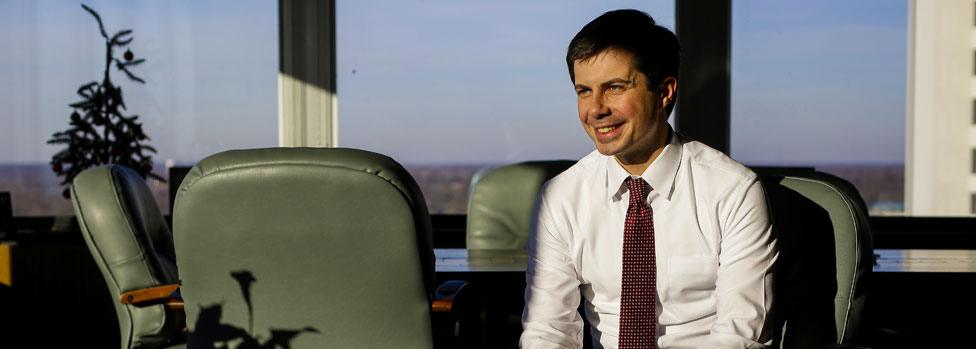
Where their aging parents, the postwar Baby Boomers, may not be as concerned about long-term impact of US policies, Mr Buttigieg says Millennials will have to deal with the fallout from today's crises for decades.
Mr Buttigieg enters the race with a unique resume. He's an openly gay veteran of the Afghanistan War and a Rhode Scholar. As mid-western mayor, he's shown he has voter appeal in a region that helped deliver the presidency to Donald Trump.
The march of time ensures Millennials will run things someday. A Buttigieg presidency is a long shot for 2020, but his candidacy is a sign of things to come.
What has Trump said? "Alfred E Neuman [Mad magazine cartoon] cannot become president of the United States."

Andrew Yang
Who? An entrepreneur, 44, born in New York to Taiwanese parents
Key issues: Universal basic income; social media; trickle-up economic reform
One policy: Yang has proposed creating a new federal agency to oversee social media and tackle what he described as "a huge surge in depression, anxiety and emotional issues"
Anthony's take: A technology entrepreneur who is proposing the US government pay a $1,000-a-month "freedom dividend" to all Americans between the ages of 18 and 64 as a form of universal basic income to cushion against fewer jobs due to increased automation.
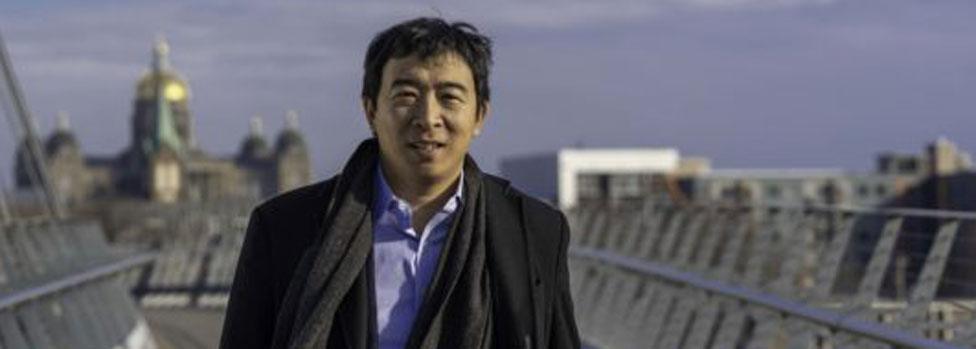

Amy Klobuchar
Who? Lawyer and current Minnesota senator
Key issues: Infrastructure investments; mental health programmes; lowering prescription drug prices
One policy: A $100bn plan to tackle substance abuse and mental health - paid for in part by opioid manufacturers - by expanding state and local funding for mental health programmes
Anthony's take: Amy Klobuchar may not be a household name, but the senator cruised to 2018 re-election in Midwestern-ish Minnesota. Another former prosecutor, she came off as coolly competent in the heated Brett Kavanaugh confirmation hearings.
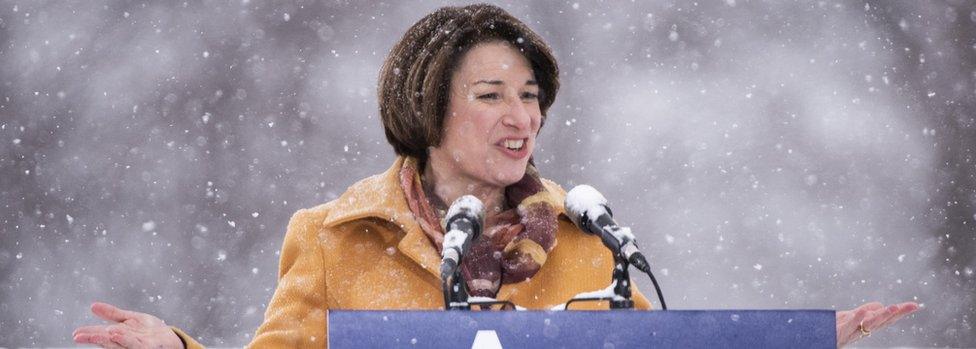
What has Trump said? "Amy Klobuchar announced that she is running for President, talking proudly of fighting global warming while standing in a virtual blizzard of snow, ice and freezing temperatures. Bad timing. By the end of her speech she looked like a Snowman(woman)!"

Tulsi Gabbard
Who? Born in American Samoa, aged 37, represents Hawaiian district in Congress
Key issues: Ending interventionist foreign policy; climate change; gun control
One policy: Gabbard's OFF Fuels for a Better Future Act would end subsidies and tax cuts for fossil fuels, ban fracking, require electric companies to use 80% renewable resources by 2027, as well as order zero car emissions by 2050
Anthony's take: Tulsi Gabbard, the first Hindu member of the US Congress, is a difficult candidate to characterise.
Most of the Hawaii congresswoman's views fit firmly in the Democratic Party's progressive camp. She was an early and outspoken supporter of Bernie Sanders' 2016 presidential campaign and has been an advocate of universal government-provided healthcare, raising the minimum wage and an anti-interventionist foreign policy.
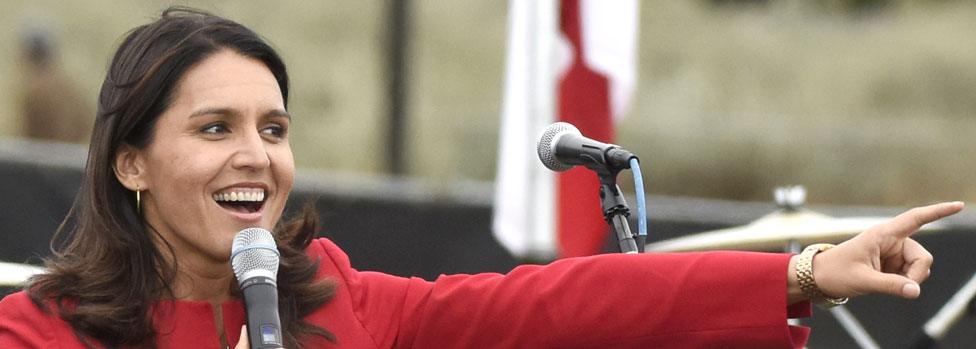
The Iraq War veteran has drawn criticism, however, for meeting with Bashar al-Assad in January 2017 - after the Syrian president had been accused of repeatedly using poison gas on civilian populations. The daughter of a socially conservative politician and activist, Ms Gabbard may also draw the ire of Democratic voters for her past criticism of "homosexual extremists" and opposition to abortion rights and gay marriage.
She's also opposed the Iran nuclear deal and condemned "Islamic extremism" in language more reminiscent of a Republican candidate.
If Democrats are looking for a young, charismatic iconoclast - even if it means supporting someone whose views don't always match their own - then Ms Gabbard might have a shot. As Republicans will attest, stranger things have happened.

Michael Bennet
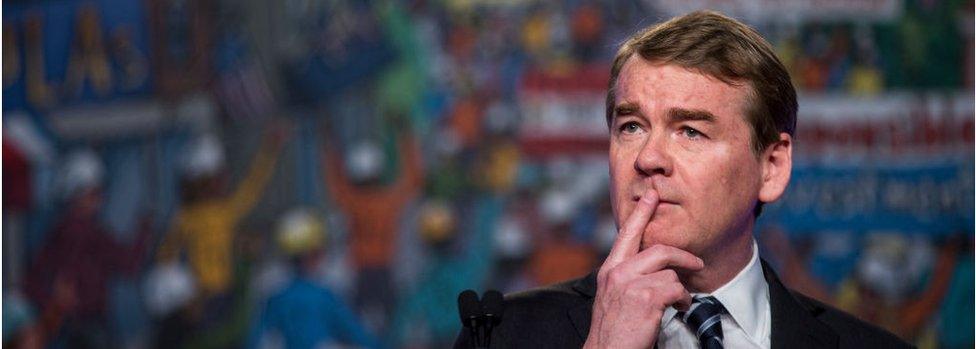
Who? Colorado senator, the former head of Denver's public school system
Key issues: Economic reform; agriculture; criminal justice reform
One policy: Bennet is a co-sponsor of the American Family Act of 2019, which seeks to expand the child tax credit based on income level and pay it monthly rather than through tax refunds
Anthony's take: Bennet styles himself as a moderate who has shown he can win elections in a battleground state - a pragmatist who can advance progressive priorities like healthcare, education and equitable economic growth through bipartisan consensus.
As the surge in support for South Bend, Indiana, Mayor Pete Buttigieg has shown, it's not impossible for a little-known politician to break out onto the 2020 national stage. That may give Bennet some hope. He had his own viral moment when he sharply disparaged perennial Democratic villain Ted Cruz from the Senate floor earlier this year. Bennet will have his work cut out for him, however, just to stand out in a rapidly settling field and be one of the 20 Democrats who make the first Democratic primary debate stage in late June.

Michael Bloomberg
Who? Billionaire former New York mayor
Key issues: Economy, immigration, gun control, climate change
Anthony's take: Mr Bloomberg is a very data-driven businessman. But it doesn't take an advanced degree in quantitative analysis to realise that the Democratic field, even at this (relatively) late date is still in flux.
There are four candidates at or near the top of early state and national primary polls - all with their strengths, of course, but also obvious weaknesses. His strategy appears to be to let the other candidates fight it out in the early voting states, then take on a diminished field later in the process, where his near unlimited resources will allow him to compete in the dozens of states that vote in March.
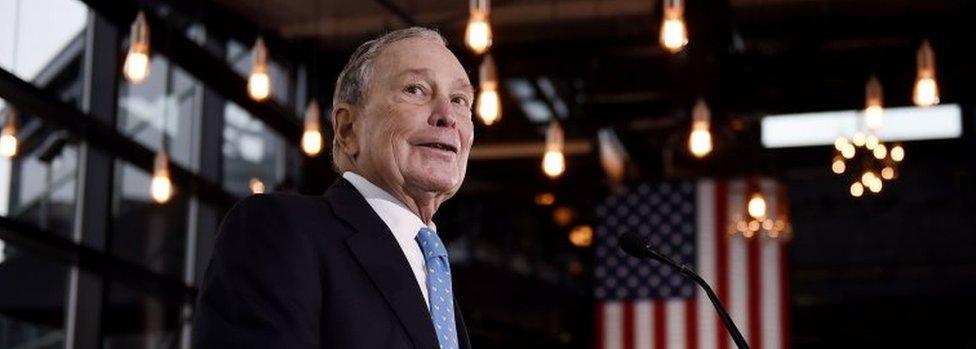
It's a risky play that only someone of Mr Bloomberg's vast wealth can afford to make.
Even so, it takes quite a leap of faith to imagine that Democrats these days are ready to jump over to a New York City plutocrat ex-Republican with a smorgasbord of a record that's business friendly, fiscally conservative and includes opposition to government-run health insurance and legalised marijuana, and past support for aggressive policing measures.
At the very least, however, his entry will provide him a means to push a party that he sees drifting dangerous leftward back to the pro-business centre.
What Trump has said? He taunted Mr Bloomberg just before he announced his presidential bid, saying there was "nobody I'd rather run against than little Michael".

Tom Steyer
Who? California's billionaire financier
Key issues: Climate change , healthcare
One policy: Steyer's campaign launch video focused on "pushing power down to the people" and blaming corporations for most of the nation's "intractable" problems
Anthony's take: Tom Steyer appeared to close the door on a presidential bid back in January, instead pledging to do whatever it takes to remove Donald Trump from office via the constitutionally outlined impeachment process.
He has changed his mind, which is the kind of luxury afforded a billionaire.
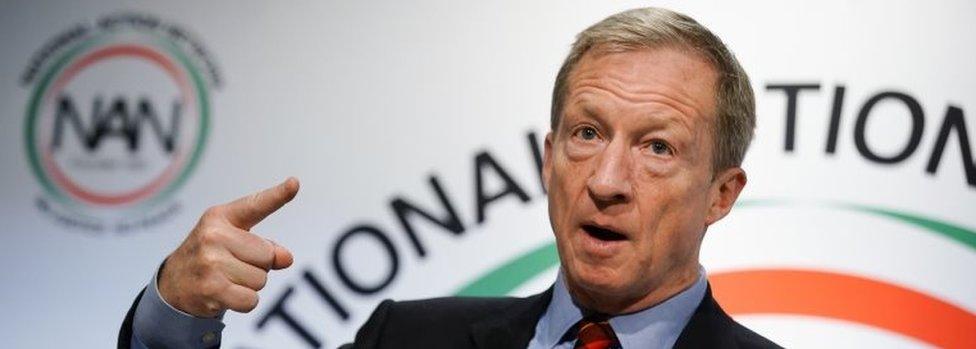
It's not exactly apparent what path someone like Mr Steyer, a hedge-fund tycoon who has a history of advocating for liberal causes, has to the Democratic nomination. With campaign budget limited only by his imagination, if there is even the smallest path he has the resources to bulldoze it clear.
At the very least, he could be a disrupter in the electoral process, free to challenge his opponents to take a more aggressive stand on impeaching the president and push them on environmental issues.
His largess has made political allies across the US, and his grass-roots impeachment organising efforts helped build a million-strong contact list of like-minded voters.
What has Trump said? A few months before Steyer's announcement that he would run, Trump described him "weirdo".

Deval Patrick
Who? Former Massachusetts governor
Key issues: Healthcare, climate change
Anthony's take: Just when it appeared the Democratic presidential field was shrinking in earnest, it starts expanding again.
First, former New York Mayor Michael Bloomberg began motioning toward a campaign. Now Deval Patrick has jumped in with both feet.
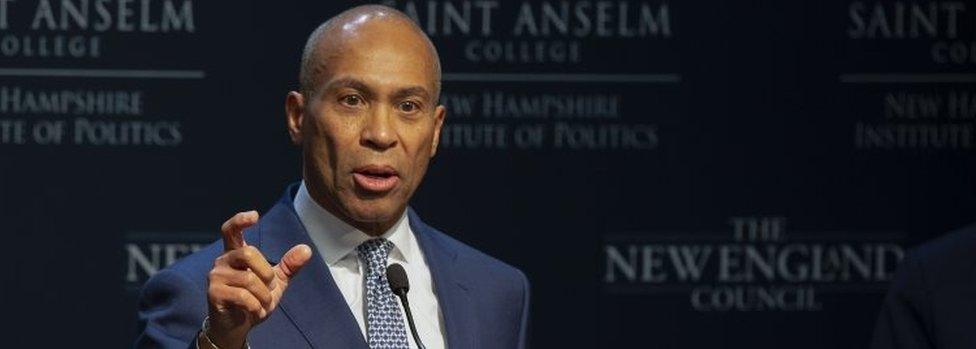
The former Massachusetts governor has a tall task ahead of him if he wants to seriously compete for his party's nomination. Unlike Mr Bloomberg, he does not have a seemingly bottomless personal fortune to draw on for campaign expenses. Fundraising is one of the most important components of a successful presidential bid, and Mr Patrick will start at zero with only a few months until the primaries begin.
It appears Mr Patrick will count on his personal charisma and a focus on early voting New Hampshire, which borders his home state, to jump-start his campaign. He is pitching himself as an optimistic mainstream Democrat who can unite the country after the divisive Trump presidency. And he's a charismatic African-American candidate who counts the Obamas as close friends.
